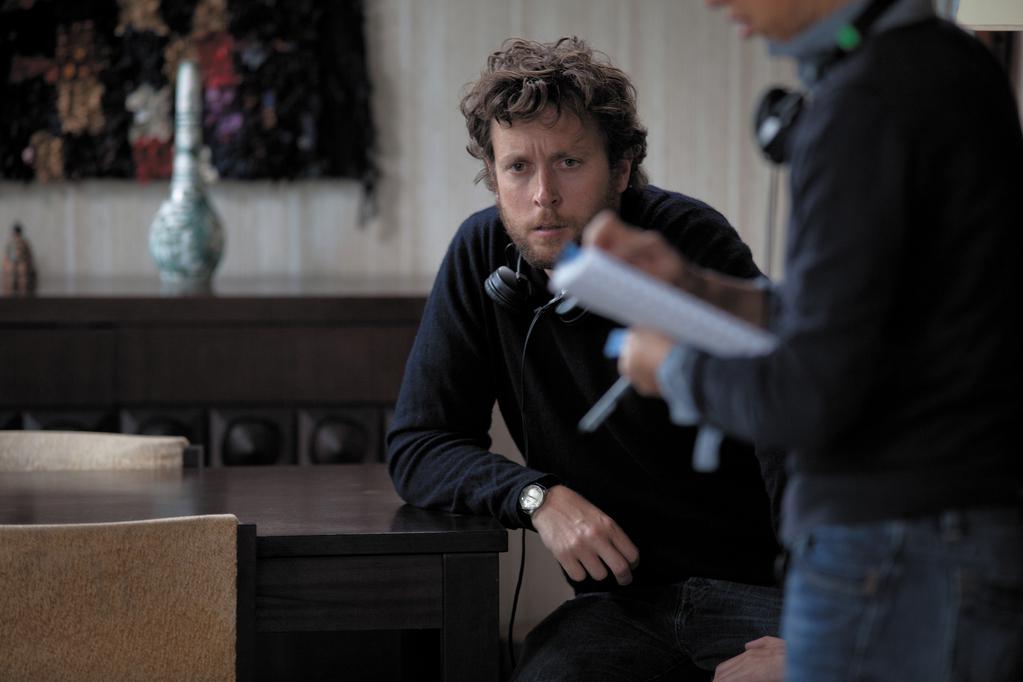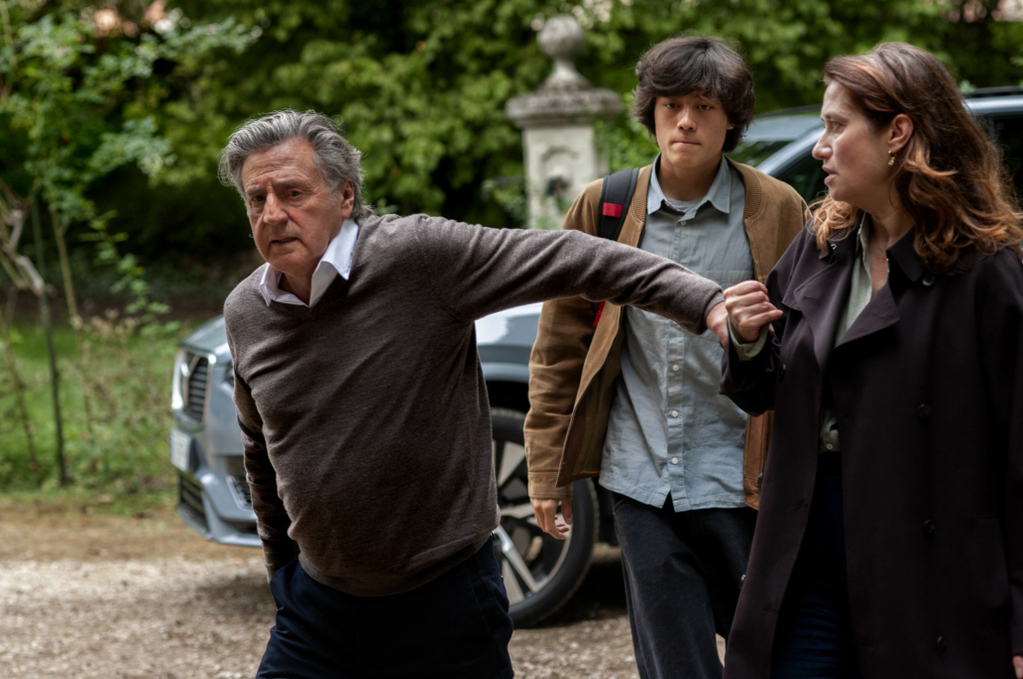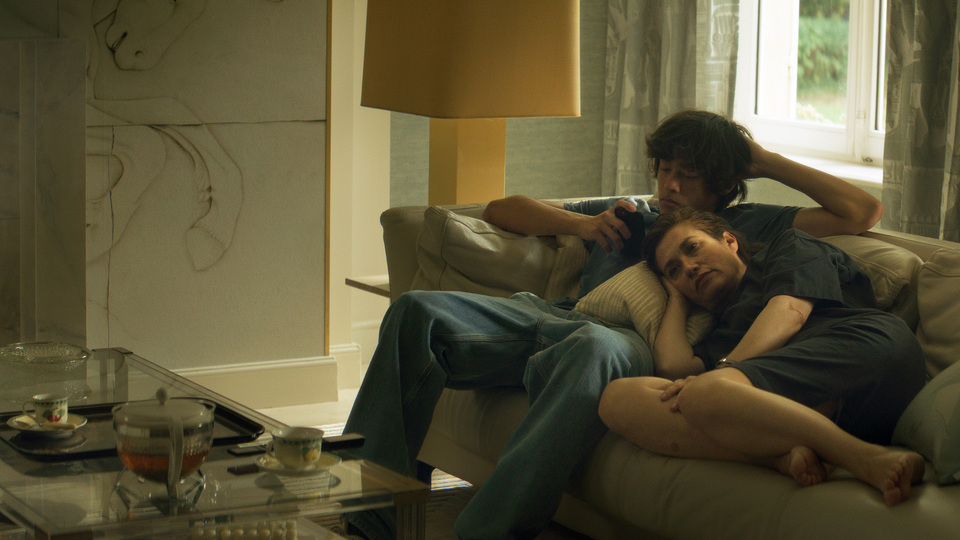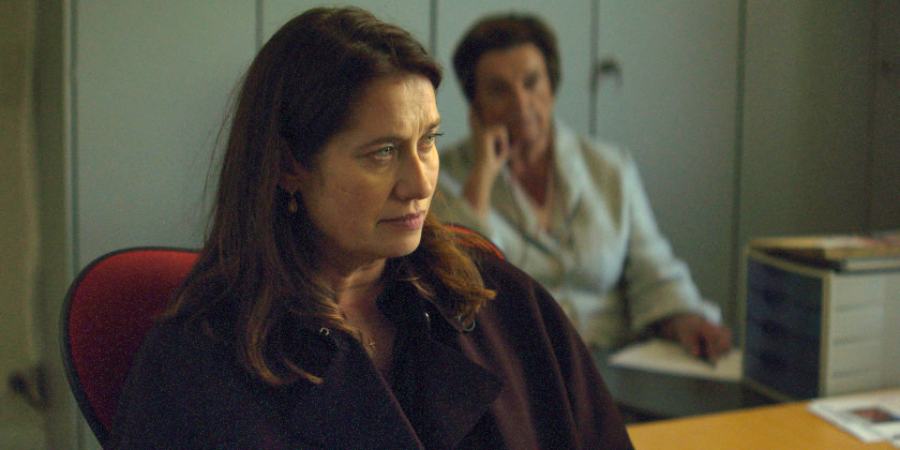For Belgian filmmaker Joachim Lafosse, one emotion defines his new feature. “I wrote A Silence (Un silence) because I was thinking about shame,” he says. “And the question that a director has to face—one that fascinates me—is ‘How do you film shame?’” In the end, he says, “the straight answer is that it’s the actors who make it possible.” In A Silence, it is above all Emmanuelle Devos—a remarkable, subtle, and versatile performer with a mastery of small, transforming detail—who renders it so viscerally.

Devos plays Astrid, the wife of a lawyer, François (Daniel Auteuil), who is acting for the parents of two child victims in a controversial, highly-politicised case of abduction and murder. François is under constant scrutiny; members of the media are camped outside the front gate of their house, day and night, eager for an interview, a photograph, a break in the story. Astrid is there in the background, quiet and supportive, keeping the household running, particularly when it comes to managing their teenage son, Raphaël (Matthieu Galoux), who is having a few problems at school. But something is about to change, and it has to do with a terrible family secret she has been involved in keeping for more than 30 years.
“The question that I would like to succeed in sharing with the audience,” says Lafosse, “is how does it happen that she doesn’t manage to speak? And why?” It’s not about blame, he says. “As an artist, I am not judge or prosecutor. And the question of ‘how’ interests me much more than ‘why.’” Astrid’s willingness to keep that secret, Lafosse says, is not straightforward, and he wants to understand where it comes from. “She’s not from the #MeToo generation, she’s one of those women who’s appreciated when she stays quiet.”
When talking about Devos and how she can illuminate a situation, there is a scene that Lafosse singles out. Astrid is on the phone, grappling with a conversation, repeating rationalisations and gradually realising their futility. “What she does,” he says, “I couldn’t have written. And it’s the heart of the film. It’s the way Emmanuelle, in her silence, with the sound of her breathing, suppressing a sob—that does everything.”
He mentions other actors he has worked with and what he has seen them bring to a film: Isabelle Huppert, in his 2006 feature, Private Property (Nue propriété), as a mother in a complex, intense relationship with her grown-up sons; Émilie Dequenne in Our Children (À perdre la raison, 2012), as a wife overwhelmed, with devastating consequences, by the impact of her husband’s controlling benefactor; Leila Bekhti in The Restless (Les intranquilles, 2021), as a woman trying to maintain the family equilibrium in the face of her husband’s increasing instability. “Emmanuelle is in the same category with all of them.”
Yet her character wasn’t initially at the centre of A Silence. The starting point for the film was a news story from 2008 about a lawyer who had represented the parents of two young victims in a notorious murder case in Belgium and turned out to have some grim secrets of his own. Lafosse started working on a screenplay inspired by the story, but soon put it on hold to make another movie. When he returned to the project, he started writing from the point of view of a different character. Finally, after making The Restless, he felt ready to go back with a new perspective altogether: he wanted to tell his story through the figure of the wife and mother.

There were some choices, however, that he always knew were important. “When I came across the news story I said to myself very quickly, you have to be sober and restrained in the mise en scène. You have to be, to a certain extent, classical in the formal sense.” There is emotional and literal violence in the story he’s telling, he says, “but if I show or film the violence I speak of, the spectator will recoil. They won’t feel empathy; they won’t be able to live with the film.” He wants his audiences to feel things, however. “When you buy a ticket to the movies and you take your place in the cinema, you are there to experience feelings and sensations. And without those feelings there is no genuine thought.”
When you buy a ticket to the movies and you take your place in the cinema, you are there to experience feelings and sensations. And without those feelings there is no genuine thought.
—Joachim Lafosse
At the same time, there is something austere about the way he presents this bourgeois family in crisis and in denial. He films his characters at a distance—through the frame of a doorway, down a corridor. Close-ups are judiciously used. He creates a sense of the family’s comfort and containment, of their home as an elegant fortress: a large two-storey house, with extensive grounds and a swimming pool, surrounded by a high wall. But we often see it at night, when it’s full of shadows and slivers of light and the relative silence accentuates the sounds we hear.
Lafosse opens the film with Astrid at the wheel of a car. The camera is situated behind her, at an angle, and you can see her eyes in the rear-vision mirror, darting here and there. The drive takes longer than you expect. This seems like the most low-key kind of tension imaginable, and yet by the time she has pulled over and found a spot near her destination, a police station, there is a clear sense of anxiety and anticipation. He had not written the opening that way, he says. That moment in the car was going to be very brief. They had just filmed another driving scene, one that contained a significant revelation, and there was something about Devos’ body language that gave him an idea for a longer scene. “I said to my DOP, Jean-François [Hensgens, with whom he has made seven features], ‘This is the beginning of the film.’ It’s a way of saying to the audience, ‘Let yourself go,’ without really knowing what is going on.” After this opening—one of more than a dozen scenes that take place inside a car—Lafosse takes us back to an earlier time, just before things began to fall apart in Astrid’s world.
A Silence bears many similarities to the story that first set it in train, but there is an additional element bound up with events from Lafosse’s past. There was a particular reason why this story resonated with him. It is connected to his 2008 film Private Lessons (Élève libre), about the sexual exploitation of a teenage boy by a small group of adults. In the film, one man in particular, who is meant to be helping the boy study, is in fact grooming him. There is a confronting directness in the depiction of a boy’s trust being violated. Private Lessons was autobiographical, Lafosse says, although he did not make this public at the time.
Lafosse was taken aback by that film’s reception for a number of reasons. “I wrote it hoping that people who knew me as an adolescent would recognise what had happened, but those people crossed over to the other side when they saw me on the street.” Then there were reviews, often positive, that saw this as a story of ‘a sentimental education’ or an intriguing tale of transgression. He felt shame, he says, in the aftermath of the film, and he poured into A Silence many of the unresolved aspects of that experience. The final version was made possible, he says, when he had a breakthrough conversation with someone close to him. “Then I realised I had to show this through the point of view of the mother.”

Devos describes playing Astrid as a physical challenge. “It hurt. Every day making this film, there was a heavy weight on my chest. It was so difficult to not be able to talk; it makes you ill.” Working opposite Auteuil, who gives a disconcertingly plausible account of a character who seems able to talk his way out of anything, she couldn’t help thinking of another film they had made together, Nicole Garcia’s The Adversary (L’adversaire, 2002). It is based on a true story about a man who spent 20 years pretending that he had been working for the World Health Organisation but had been without a job all that time, and embezzling money from friends and family. When it looked as if his deception was about to be revealed, he killed his wife, children, and parents—perhaps in an attempt to cover his tracks, or perhaps because he did not want them to discover the truth.
It hurt. Every day making this film, there was a heavy weight on my chest. It was so difficult to not be able to talk; it makes you ill.
—Emmanuelle Devos
“I thought when I was making that film, how can it be that his wife saw nothing, his parents saw nothing, his friends saw nothing?” Devos says. Yet, she adds, “It’s so easy to lie to people. We believe things very easily; we want to believe what people tell us. It’s crazy, but denial is the most powerful human quality.” It’s true of everyone, of every era, culture, and country, she says. “Denial is a form of protection against the violence of the world.”
A Silence opens in Australian cinemas on the 27th of June.
**********
Philippa Hawker is a film and arts writer. She is working on a book about Jean-Pierre Léaud.
Philippa Hawker travelled to Paris with the assistance of Unifrance.


